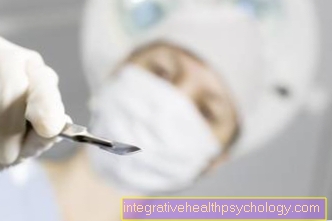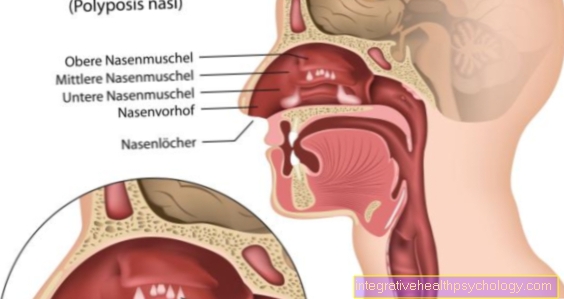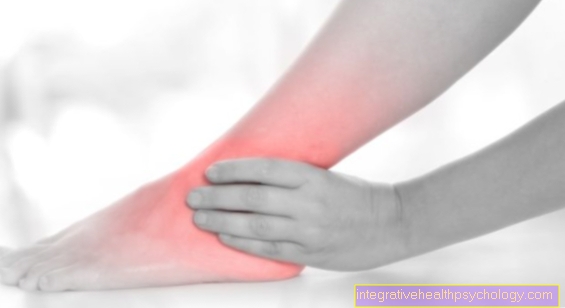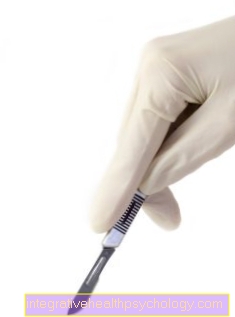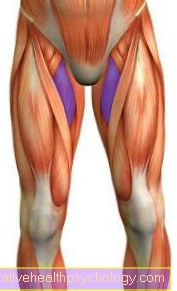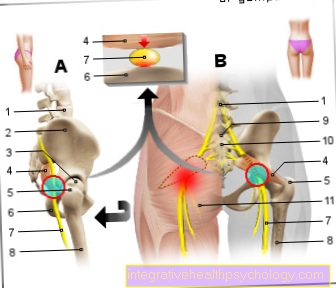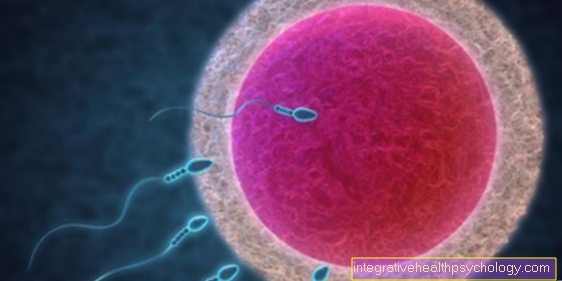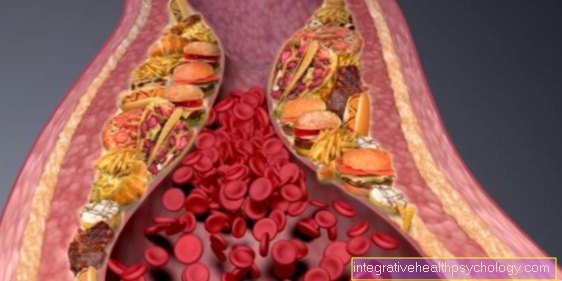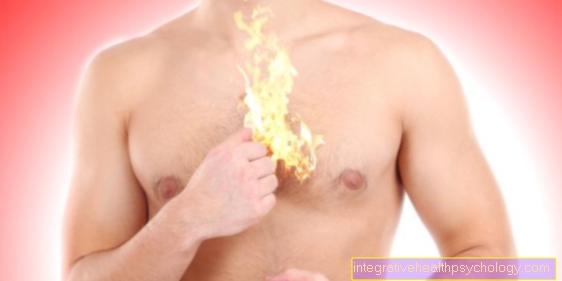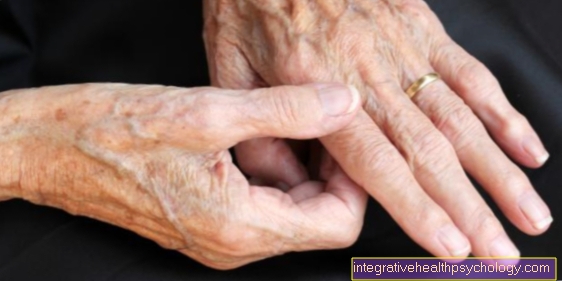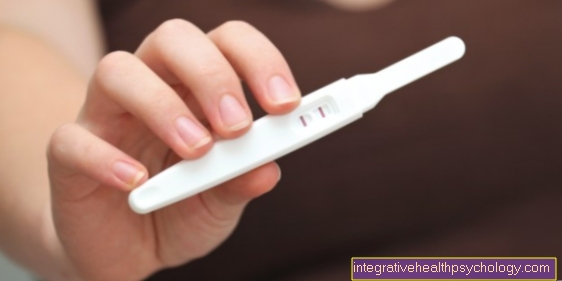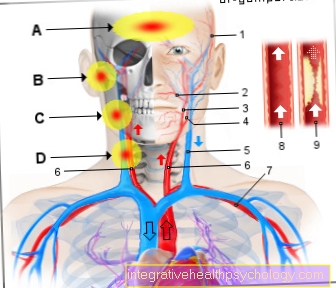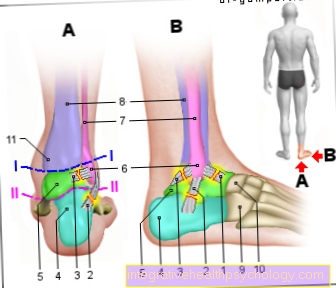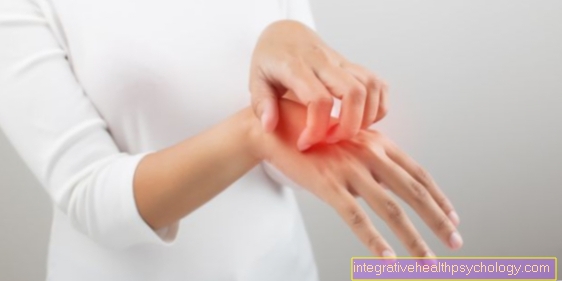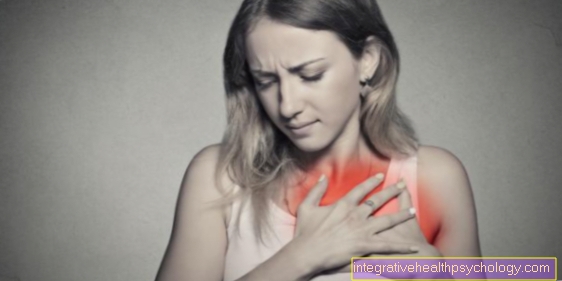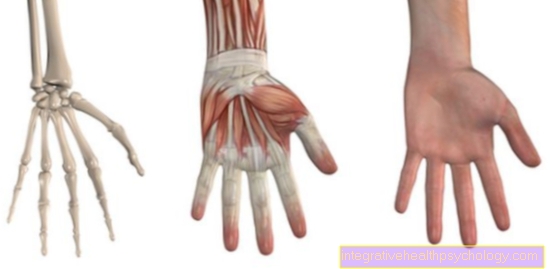lithium
Explanation / definition
Lithium is a classic drug that is still used today as the first choice for treating mania and for preventive therapy in bipolar affective disorders (mania / depression).

Trade names
Lithium aspartate (lithium aspartate), quilonum (lithium acetate), Hypnorex ret, Li 450 "Ziehten", quilonum ret., Lithium apogepha, leucominerase (lithium carbonate)
Chemical name
Lithium aspartate, lithium acetate, lithium carbonate
Active ingredient
lithium
application areas
- mania
- Bipolar Affective Disorders (Manic Depressive Disorders)
- Preventive therapy for (unipolar) depression
- Preventive therapy for schizoaffective disorders (however no official approval)
Dosage form
Lithium is used in as a tablet or film-coated tablet taken.
After taking the tablet, it dissolves in the Gastrointestinal tract on and the lithium is released.
The free lithium ions can now be absorbed into the cells of the intestinal mucosa. Since lithium is in his chemical structure the sodium, which is present everywhere in the body, looks very similar, it enters the cell via the same transporters. While the absorption is very successful, the cells have more difficulty releasing the lithium back into the bloodstream.
Therefore, if the doses are too high, too much lithium can accumulate in the body and cause it to Symptoms of intoxication comes. For this reason, it is important to stick to the given amounts when taking it. It is also essential that the lithium level in the blood is checked regularly so that the dose can be adjusted and there is no overdose.
It should also be noted that the predominant part of the lithium is directly via the kidney is excreted, so that the amount of active ingredient that is administered via a tablet does not correlate with the amount that actually works. Patients who are treated with lithium are issued a lithium passport in which the measured concentrations are noted in the follow-up checks. In this way, the attending doctor can get a good overview of the active levels and in an emergency the passport gives the assigned doctor important information about the therapy.
Lithium is an active ingredient that helps Pregnant women uninhibited into the bloodstream of the unborn child got.
This is the reason why people stopped taking lithium in the sixties pregnancy was considered contraindicated.
However, over time, studies have shown that one Absolute renunciation is not necessary is. Today it is recommended to lower the dose and take smaller amounts several times a day instead of the full daily dose in the evening. Furthermore, the pregnant woman should avoid a low-salt diet in order to prevent an accumulation of lithium in the body.
In the week before the birth, the dose should be reduced further in order to be able to temporarily stop the drug completely when the onset of labor.
This is due to the fact that the woman's water balance changes during birth, which can lead to an increase in lithium in the blood - with the consequences mentioned above.
If lithium therapy is to be stopped, it is imperative that the dose slowly sneaked out otherwise symptoms such as anxiety, inner restlessness or one manic phase can come.
Lithium is a very old drug and its psychological effect was first described in 1949.
Lithium is always in the tablets as salt Contained in conjunction with another substance. This is carbonate (in Hypnorex® from Sanofi, Lithium Apogepha® and Quilonum® retard from GlaxoSmithKline), sulfate (in Lithiofor® from Vitor Pharma) or aspartate (in lithium aspartate from Koehler Pharma).
effect

Lithium has a variety of effects on the central nervous system. To date, it has not yet been fully clarified which of the following effects is ultimately responsible for the effectiveness, especially in manic-depressive illness:
- Inactivation of ion channels: By intervening in the cellular sodium-potassium current, similar to anticonvulsants (drugs against epilepsy), the central excitability of the brain is presumably reduced overall.
- Effect on second messenger systems: All functions of life take place on the smallest cell level. Some of the most important executive tools are enzymes and proteins. Now that lithium intervenes in such enzyme chains. (Inhibition of inositol monophosphatase) there is a waste of certain enzyme products and their secondary products (inositol or phosphatidylinositol). The inhibition of these (and other) products ultimately leads to a decrease in the concentration of calcium in the cells in further tortuous ways. This is exactly what we want, since the so-called intracellular calcium concentration is typically increased in manic-depressive illness. Phew ... it's complicated, isn't it?
- Release of GABA: GABA is a messenger substance in the brain that, like other messenger substances, is directly related to mood. Lithium ensures an increased release of GABA
- Serotonin level increase: Lithium leads to an increased release of the "mood transmitter" serotonin and at the same time inhibits its breakdown.
Read more about psychotropic drugs
dosage
In general, it can be said that lithium should be taken in the evening. For this reason, in most cases side effects are simply overslept. The amount that the individual patient has to take depends directly on the so-called plasma concentration, i.e. the amount of the drug in the blood. Particularly at the beginning of therapy, regular blood samples must be taken so that you don't accidentally “overshoot”. The start of lithium therapy should ideally take place under inpatient conditions, i.e. in a hospital.
Lithium is available in Germany in doses of 150mg (leukominerase) up to 536mg (quilonum).
As a rule, the plasma level must not exceed a concentration of 1.2 mmol / l, otherwise there is a risk of serious side effects. (see below)
Side effects
The side effects of lithium therapy are Rare and also easy to get to grips with. It only happens very rarely massive symptoms of intoxication. If the patient is well adjusted and observed during therapy, signs of side effects can usually be recognized early. The patient himself should also observe himself and if irregularities are noticed, consult the attending physician. This gives you the opportunity to react in good time and, under certain circumstances, adjust the dose or take other measures. In this context, it is also important to pay attention to possible interactions with other drugs.
The side effects usually depend on the dose, so that if symptoms occur, a dose reduction can be helpful; this should be decided by the doctor together with the patient.
Side effects are common in clinical practice especially at the beginning lithium therapy, less so in long-term treatment.
The most frequently complained about NW are:
- Tremor (subtle tremor)
- Retention and concentration disorders
- Increase in weight
- Frequent urination
- Nausea, diarrhea
- Vomit
- thirst
- Urination / increased urination (polyuria)
There can often be a special in the first two years of treatment Weight gain come, which also occurs depending on the dose.
There are special roles in the treatment with lithium thyroid and the kidney to.
- Lithium can be used in the thyroid an increase in TSH and an enlargement of a Goiter (Enlargement of the tissue). In other rare cases, there may be a Hypothyroidism and one Overactive parathyroid glands to lead.
- In the Kidneys Lithium can lead to kidney dysfunction, which usually disappears on its own after stopping the drug. In very rare cases it can also lead to a inflammatory complication (glomerulonephritis) to lead.
From the above For reasons, it is therefore essential to carefully examine the thyroid and kidneys of a patient with the help of laboratory tests before starting therapy.
Neurological side effects
In the area of nerve and muscle function, the following symptoms can occur in rare cases when taking lithium.
- Muscle weakness
- Muscle tremors and twitching
- Movement disorders
- decreased nerve conduction velocity
- Disorders of the reflexes
- Nystagmus
- Visual field loss
It can also cause cognitive impairments like Memory problems, Drowsiness, Clouding of consciousness and to psychiatric phenomena like Hallucinations and anorexia come.
Lithium therapy may also have side effects such as slurred speech and dizziness.
Another side effect that can be unsettling for the patient is the so-called Pseudotumor cerebri, this leads to increased pressure in the skull, whereby a tumor can be excluded as a possible cause. Symptoms are more severe Headache with a feeling of pressure that increases when lying down, coughing or sneezing.
This side effect can be treated with a potent diuretic or a regular withdrawal of nerve fluid, which is used to lower the pressure in the brain.
Vegetative side effects
The following undesirable effects can occur at the vegetative level:
- Taste disorders
- increased saliva production or dry mouth
- low blood pressure (hypotension)
Not only at the beginning of lithium therapy, but also in the further course, it can lead to digestive disorders such as diarrhea, nausea and vomiting.
Patients rate the rare side effects affecting sex life such as Loss of libido and limited potency up to impotence.
Weight gain as a side effect
The long-term use of lithium for the prophylaxis of bipolar affective disorders (mixed forms of mania and depression) is often accompanied by a continuous weight gain. The lower the dose of lithium used for therapy, the less pronounced the increase in weight. The causes are not yet fully understood - the influence of lithium on appetite-regulating centers in the brain is being discussed.
However, the weight gain is very slow. Experience has shown that it is approximately 1 kilogram per year, but can differ significantly from patient to patient. It mainly affects patients who were overweight before starting therapy. Since prophylactic treatment with lithium can take several years or even decades, overall strong weight gains are possible. Individual patients gained between 30 and 40 kilograms. For this reason, regular weight checks should take place during therapy and the weight should be checked by the treating doctor.
Changes in the blood count and water balance
Changes in blood counts can also occur, so it can lead to one Multiplication of the Leukocytes come in the blood and become one Humiliation of pH value.
Possible increased blood sugar levels are especially for diabetic relevant.
Furthermore it can be too Electrolyte shifts in form of a Hypercalcemia and decreased potassium and sodium levels come. The latter are the result of an incorrectly regulated water balance. In the course of such can also Edema and the above polyuria occur.
Damage to the kidney With long-term therapy it can sometimes be observed that this additionally exacerbates the problem of fluid regulation.
Inflammatory processes
There may also be side effects that can cause rheumatoid symptoms resemble, so are already Joint pain, muscle pain and the Flare up one Psoriasis vulgaris been observed. Other inflammatory processes can also develop from the ingestion of lithium. So it can too gastritis, Rashes, Swelling of the lining of the mouth, acne similar symptoms, itching and Edema come.
Side effects in the cardiovascular system
In the course of therapy with lithium, complaints may also arise that include the heart affect. These include Cardiac arrhythmiaswhich in this case are usually accompanied by a slowdown in heart rate. Changes can also be noticed when measuring an EKG. Especially initially, there may be a Hypotension, so blood pressure that is too low.
Lithium poisoning (lithium intoxication)
As mentioned above, the plasma concentration of lithium should not exceed 1.2 mmol / l. However, this is only a guideline, as the principle of individual tolerance also applies here. From a concentration of 1.6 mmol / l, however, the probability of the occurrence of symptoms of intoxication is considered to be quite certain.
Symptoms of lithium poisoning are:
- Noticeable coarse hand tremors
- dizziness
- Indistinct speech
- Nausea and vomiting
- diarrhea
- Gait disorders
Such poisoning can be very, very serious and in the worst case also to the coma and also to Cardiovascular arrest and thus lead to death.
The possible causes such poisoning are also important to know. Of course, accidentally taking more tablets but also attempting suicide can be considered. But it is extremely important that you as a patient, but also as a family member, know that lithium directly to the sodium - Household (body salt) is coupled. What does that mean now?
For example, if a person eats a low-sodium diet, the body will try to preserve the salts it already contains. As a result, the salt excretion, in particular the excretion of sodium, is reduced and thus also the lithium excretion, which in turn leads to an increase in the plasma concentration and can lead to symptoms of poisoning.
Further reasons that can lead to a preservation (i.e. the retention) of sodium and thus to an increase in lithium are: profuse sweating, diarrhea, water remedies and fluid loss through e.g. Burns etc.
In conclusion, it should be noted that while taking lithium only very rarely comes to serious and life-threatening side effects. If the first symptoms of poisoning in the event of an overdose are noticed in good time, action can be taken.
If other disturbing side effects occur, these are often dose-dependent and, if the condition allows, can be avoided by reducing the dose under certain circumstances. Furthermore, when adverse effects of lithium occur, it is always necessary to weigh up whether the effect and side effect are in an acceptable relationship, i.e. whether any side effects can be accepted for a good treatment of the underlying disease.
interaction
Lithium interacts with many other drugs. In the following now the interactions with the most important from our point of view:
- Neuroleptics: There may be an increased occurrence of neuroleptic side effects, which in individual cases also increase the risk of a so-called "neuroleptic malignant syndrome".
- SSRI: The likelihood of experiencing lithium side effects increases. The antidepressant effect can, however, improve with the simultaneous administration of lithium (lithium augmentation).
- Tricyclic antidepressants: increased tremors may occur. The antidepressant effect can, however, improve with the simultaneous administration of lithium (lithium augmentation).
- Nonsteroidal anti-inflammatory drugs (NSAIDs): Possibly. Delayed elimination of lithium and thus risk of accumulation and thus a rise in plasma.
- ACE inhibitor (high blood pressure drug): The lithium level can rise and thus the risk of side effects increases.
You can also read our article on the interaction between lithium and alcohol: Lithium and alcohol - are they compatible?
Lithium and alcohol
The combination of lithium with other drugs and alcohol can result in numerous, not yet known Interactions come. The exact mechanisms of action are not known. However, since even slightly increased amounts of lithium in the blood can lead to sometimes considerable and life-threatening side effects, the combination with other preparations is always with the discuss the attending physician.
After ingestion, lithium is absorbed into the blood in the form of tablets and excreted from the body via the kidneys. It is not metabolized by the liver and therefore has no effect on liver function. Because of this, there is no interaction with alcohol during metabolism in the liver. Nevertheless, lithium reduces these by a mechanism that has not yet been clarified Alcohol tolerance. For this reason, even a low consumption can lead to sometimes considerable side effects. Patients often report impaired consciousness (film tear, fainting). However, the reverse is not true increased lithium concentrations to be feared from the stress on the liver from alcohol.
More information can be found here: Lithium and alcohol - are they compatible?
Contraindication
The use of lithium is not recommended in patients with:
- Disorders of the sodium balance
- Addison's disease
- Kidney dysfunction or diseases that lead to it such as arterial high blood pressure
- Thyroid dysfunction (has to be discussed individually)
Lithium in pregnancy
In drug therapy with lithium during pregnancy, the active ingredient can enter the baby's bloodstream via the placenta. The same concentrations of lithium are therefore found in the child's blood as in the mother's blood. The exact effects of high lithium levels in the child's circulation are not yet clarified.
For this reason, during the first trimester of pregnancy, one should Therapy with lithium should be dispensed with. As studies have shown, there is an increased risk of malformations. Among other things, malformations of the heart are common (Ebstein anomaly) occurred. It is only possible to administer lithium during this period in a few exceptional cases - the attending physician must weigh up the benefits and risks.
In addition, lithium should be discontinued in the period before birth (approx. 10 to 30 days). During childbirth there is an altered elimination of lithium from the human body. As a result, you can significantly increased lithium levels occur in maternal and child blood. Since lithium has only a narrow therapeutic range (that is, even slightly increased concentrations can lead to severe side effects), typical symptoms are Lithium intoxication possible.
Onset of action of lithium
Therapy with lithium is indicated for two different clinical pictures: acute ones Manias and bipolar affective disorders (mixed forms of mania and depression). The onset of action therefore also differs depending on the clinical picture.
In acute mania it can sometimes be up to two weeks take until there is improvement in manic symptoms. For this reason, an accompanying therapy can be used Benzodiazepines or Neuroleptics to be required.
Lithium is used prophylactically to treat bipolar affective disorders. Therapy is usually continued over several months and years. With the onset of action is at the earliest after 6 to 12 months to be expected. For this reason, a combination with other antidepressants or neuroleptics can be indicated during this period.
price
Since there is always talk of cost pressure in the healthcare sector, we believe it is important to also find out prices for drugs (prices are exemplary and not recommended):
Hypnorex retard® N2 50 tablets € 17.11
Hypnorex retard® N3 100 tablets € 26.34
Status: January 2004
Prescription requirement
There is a prescription requirement for all dosages!



